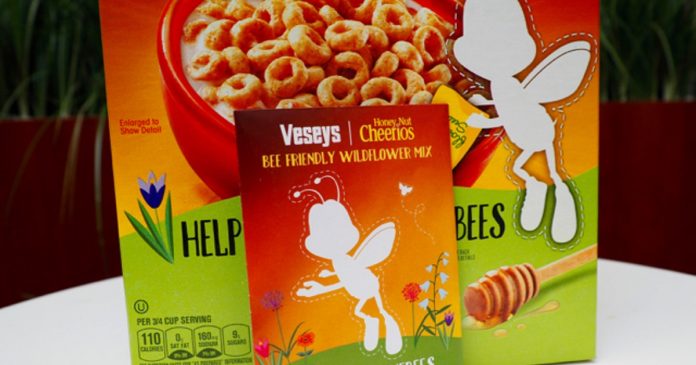
Cheerios had its heart in the right place. It wanted to help save America’s imperiled bee populations because, after all, the animated “pitchman” for its Honey Nut variety is a honeybee.
But like every tasty toasted oat in every Cheerios box, the rescue plan had a hole.
Cheerios, owned by General Mills, stuck 1.5 billion packaged wildflower seeds in boxes so that patrons could plant them. It was part of the company’s Bring Back the Bees campaign, complete with its own hashtag, which sought to create habitat that bees are losing to development, farms and insecticides.
But some of the seeds on the list are invasive species that kill native plants and take over the places where they grow. Kathryn G. Turner sounded an alarm when the free-seed giveaway came to her attention on Twitter:
“Please don’t plant this. Contains seeds of plants introduced/noxious in the US. ”
A few days after the tweet, the website Lifehacker.com contacted Turner at Colorado State University, where she’s an evolutionary biologist and postdoctoral fellow in the Department of Bioagricultural Sciences and Pest Management. The world caught on when Lifehacker’s story broke.
“The original plant listing included a plant that was invasive,” Turner said Wednesday, although the seed supplier said Chinese Forget-Me-Nots weren’t actually in the package.
Here’s what Lifehacker accurately reported: “Forget-Me-Not . . . is banned as a noxious weed in Massachusetts and Connecticut, for example. The California poppy is nice in California, but listed as an invasive and exotic pest plant in southeastern states. And many of the flowers on this list are not native anywhere in the U.S., so they are not necessarily good matches for local bees.”
The revelation seemed to pain Turner because she knows that bees are in trouble – disappearing by the millions, which, in turn, puts many crops they pollinate at risk – and that General Mills was trying to do a good thing. On Wednesday, company spokesman Mike Siemienas explained: “The Honey Nut Cheerios wildflower packets contain the same varieties of seeds that consumers will find in seed racks at major national home store chains throughout the U.S.”
And the packets are “just a small part of” General Mills’s bid to help bees, he said. The company has invested $4 million into the effort in the past five years in partnership with the Xerces Society, which works on behalf of pollinators such as butterflies and bees. “Large-scale habitat projects have already been planted or are already underway with farms supplying ingredients to Cheerios” and others, Siemienas said.
But individuals can get involved, too, as a company statement noted: “Planting wildflowers is recommended by conservationists as one of the best ways to support pollinators. It’s a fun, simple way to help.”
Fun maybe, but not so simple, according to Turner. Even though seeds are available in home improvement stores, that doesn’t mean they should be trafficked across the country in boxes to areas where they don’t belong, she said. Given some places’ ban on Forget-Me-Nots, for example, “I don’t know how they would be able to send seeds to those states.”
While several other plants on the Cheerios list are nonnative, “that doesn’t mean it will be a problem, but it’s a significant risk,” Turner said. “My thing is, why they would have chosen that at all. I have no idea. I mean it seems like some biologist should be involved. What they’re trying to do is biological.”
(c) 2017, The Washington Post · Darryl Fears

